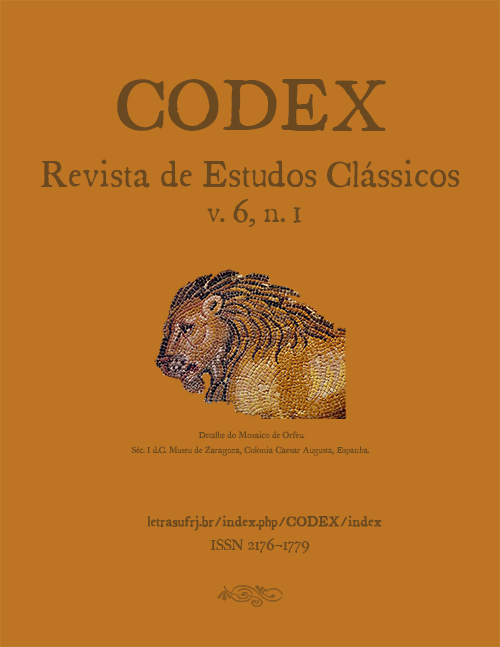As duplicidades do Édipo Rei de Sófocles
DOI:
https://doi.org/10.25187/codex.v6i1.14867Palavras-chave:
Tragédia antiga, Sófocles, Édipo, Reconhecimento, PoéticaResumo
Os principais estudiosos da peça de Sófocles, Édipo Rei (S. OT), na qual Édipo figura como governante supremo de Tebas, sugerem que a característica determinante dessa personagem seria uma espécie de ambivalência ou duplicidade fundamentais. Nesse sentido, Édipo seria na verdade não apenas um, mas dois. Assumindo essa caracterização como típica do discurso trágico (tal como sugere Jean-Pierre Vernant), demonstraremos que um agravamento de algo dessa ordem compromete a unicidade desse mÅ·thos, bem como suas personagens e suas falas, já que até mesmo seu protagonista é cindido em duas figuras diferentes e, de certa maneira, antagônicas. O objetivo do presente artigo é atentar para a complexidade da construção de seu enredo -- em seus diferentes estratagemas para proporcionar deslocamentos espaço-temporais, situações tensas, expressões de conteúdo dúbio e de valor indecidível -- com que se configura o crescendona significação trágica do drama até sua dissolução na cena em que uma verdade mais profunda é revelada num cegante e violento esplendor. O conflito entre a duplicidade da realidade humana e a univocidade do discurso divino atinge um paroxismo que já era reconhecido na própria Antiguidade e que é responsável por fazer com que essa peça seja considerada por muitos a obra-prima de Sófocles, quiçá de todo o repertório trágico da Atenas clássica.Referências
DAWE, R. D. (ed.). Sophocles' Oedipus rex. Cambridge: Cambridge University Press, 2006.
FOUCAULT, M. “2ª conferência”. In: ______. A verdade e as formas jurídicas. Trad. R. Machado e E. J. Moraes. Rio de Janeiro: Editora Nau, 1996, pp. 29-51.
KNOX, B. Édipo em Tebas. Trad. Margarida Goldsztyn. São Paulo: Perspectiva, 2002.
______. “Sophocles' Oedipus”. In: ______. Word and action: Essays on the Ancient Theater. Baltimore and London: The John Hopkins University Press, 1986 [1979], pp. 96-111.
______. “Why is Oedipus Called Tyrannos?”. In: ______. Word and action: Essays on the Ancient Theater. Baltimore and London: The John Hopkins University Press, 1986 [1979], pp. 87-95.
LIAPIS, V. “Oedipus Tyrannus”. In: ORMAND, K. (ed.). A Companion to Sophocles. Oxford: Blackwell, 2012, pp. 84-96.
SEGAL, C. “Time and Knowledge in the Tragedy of Oedipus”. In: ______. Sophocles' Tragic World. Cambridge Mass.: Harvard University Press, 1995, pp. 138-160.
SISSA, G. “A Theatrical Poetics: Recognition and the Structural Emotions of Tragedy”. Arion, vol. 14, n. 1, 2006, pp. 35-92.
VERNANT, J-P. “Ambiguidade e reviravolta. Sobre a estrutura enigmática de Édipo-Rei”. Trad. F. Y. Hirata. In: VERNANT, J-P; VIDAL-NAQUET, P. Mito e tragédia na Grécia Antiga. São Paulo: Perspectiva, 2002, pp. 73-99.
Downloads
Publicado
Como Citar
Edição
Seção
Licença
A Codex - Revista de Estudos Clássicos utiliza uma licença Creative Commons - Atribuição-NãoComercial 4.0 Internacional.
Os autores dos trabalhos aprovados autorizam a revista a, após a publicação, ceder seu conteúdo para reprodução em indexadores de conteúdo, bibliotecas virtuais e similares.
A revista se permite o uso dos trabalhos publicados para fins não comerciais, incluindo o direito de enviar o trabalho para bases de dados de acesso público.










